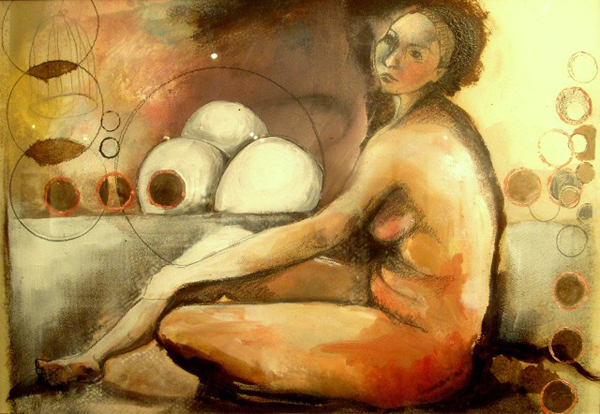By Jon Michaud
 Depending who you asked, Ms. Almonte was either the greatest teacher in the history of the world or a hard-ass, stuck-up mulata bitch who thought she was the Queen of England and Miss Manners rolled into one skinny, titless body. She taught A.P. English and was known to fail students for a few misspelled words or for not knowing where to put an apostrophe. But the worst thing a student could do in her presence was throw Spanish words into an English sentence.
Depending who you asked, Ms. Almonte was either the greatest teacher in the history of the world or a hard-ass, stuck-up mulata bitch who thought she was the Queen of England and Miss Manners rolled into one skinny, titless body. She taught A.P. English and was known to fail students for a few misspelled words or for not knowing where to put an apostrophe. But the worst thing a student could do in her presence was throw Spanish words into an English sentence.
“This is an English class,” she would say. “I want to hear English. Your future employers will want to hear English, too.”
She had followers, mostly college-bound girls who imitated her in every way they could—some more successfully than others. These devotees belonged to the Word Club, an after-school program that had begun as a prep class for the verbal portion of the SAT, but soon morphed into an extracurricular finishing school for a handful of bright, ambitious, assimilated girls headed for scholarships to the Ivy League and Seven Sisters. Behind their backs—and sometimes to their faces—they were called lesbians and wannabe whiteys, but the fact was that almost every boy in the school was in love with Ms. Almonte or one of her girls in a way that the boys would never fully understand or admit to one another. She and her girls were beyond them; they lived in the territory of the imagination. Clara Lugo was Tito’s Almonte girl. She was neither the prettiest nor the best dressed of them, but she had, by some measures, come the farthest to be there. She was dark skinned and had Chinese eyes. At her temples grew swirls of hair that looked like wispy reinterpretations of her ears. For a Dominican girl, she didn’t have much of an ass, but she was tall and her hair was long and thick.
Tito and Clara had played together as children. Clara’s father owned a hardware store on Dyckman Street, and Tito’s father was the building superintendent for 222 Seaman Avenue — a good customer. On Sunday afternoons, when the store was closed, the two families met for picnics in the park. Tito retained a clear memory of the last afternoon the families spent together. The Lugos were still wearing their good clothes from Mass while Tito and his parents were dressed casually. He and Clara were in the Emerson Playground, twenty yards from the picnic blanket. Clara came too close to the swing he was on and his foot clipped her in the mouth. It felt like nothing to him, but she cried out and brought her hand to her face.
When she drew it away, her fingers dripped with blood. She ran to the blanket, where their parents were sitting with Clara’s baby brother, Efran, eating pastelitos and drinking beer. “¡Que barbaro!” he heard his mami say, and then his papi came and yanked him off the swing to make him apologize.
Soon after that, his father and Don Roberto stopped speaking to each other. At first Tito thought it was because of the bloody lip, but, he later learned, the issue was a faulty power drill that Clara’s father refused to take back, saying that it had worked fine when he sold it to Tito’s father. The dispute escalated and Tito’s papi took his business to the Jewish hardware store on Broadway—a declaration of war.
Clara’s papi started saying things about Tito’s father, implying that he had lived too long in that building full of white people, that he had forgotten he was Dominican, that his son watched too much TV. He was going to grow up godless and unable to speak Spanish. Tito had always been afraid of Don Roberto. He was big and loud, with a chipped tooth and pockmarked cheeks. How could a man so ugly have produced a daughter so becoming? He liked to slam his hands on the counter of his store when he was making a point to one of his customers—and, it seemed, he always had a point to make. Tito was forbidden from playing with Clara and she became, in time, just another neighborhood girl, glimpsed in the subway station or crossing Broadway.
Over the following months, his mother subjected him to a propaganda campaign about Clara’s family. She said that Doña Dolores was not actually Clara’s mother, that everyone in Inwood knew this. Don Roberto, she claimed, had abducted Clara from the Dominican Republic and brought her to the United States. Her father was strict with her, and her stepmother was wicked—straight out of Cinderella. At the time, Tito thought this was all just part of the feud between his parents and the Lugos and he forgot about it. Soon enough, he befriended some of the kids in the building his father managed and Clara all but slipped from his mind. That is the way things stayed until high school, when in a process as mysterious and unmeasurable as the growth of fingernails, she re-emerged from the general population of girls to become, first, a girl and, then, the girl. By then, she had grown and filled out, matured. Once she joined the Word Club, she began straightening her hair and wearing stylish clothing. She occupied more and more of Tito’s mind and took on a significant role in his fantasy life. Between classes he looked for her, and when she did appear from the throngs in the halls, he trailed behind her, floating in the wake of her smell—of gardenias and candy—like a cartoon character following the scent of a freshly baked pie. Sometimes he would trail her all the way to the other side of the school, far from his next class. The bell would ring and he would come to himself alone in the hallway, late again.
Excerpted from When Tito Loved Clara by Jon Michaud. Copyright 2011 by Jon Michaud. Published by Algonquin Books. All rights reserved.
For more info: http://jonmichaud.com/
Order from: Amazon, Powell’s, IndieBound, Barnes & Noble
Check out the New Yorker Q&A with the author: http://www.newyorker.com/online/blogs/books/2011/03/the-exchange-jon-michaud.html
Check out my review of this amazing book: https://www.uptowncollective.com//2011/03/11/the-led-black-book-club-%E2%80%93-when-tito-loved-clara/

